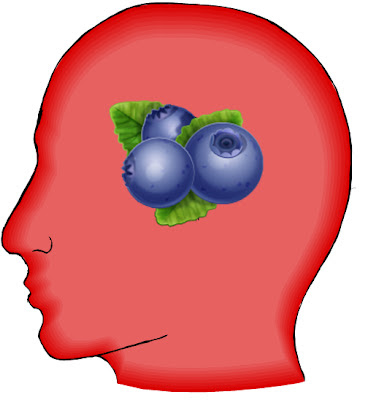
Blueberries have been honored with the “brain food” label for some time — even before we understood exactly what was meant by the term. For nutritionists, researchers, doctors, and even the layperson, it was clear that blueberries, especially the small, nutrient-dense wild blueberry, had an effect on brain clarity, brain performance, memory, and motor skills.
Through the years, researchers were able to understand more about why that moniker was so appropriate. They isolated components like antioxidants, and they began to gather data on which antioxidants affected brain function and brain aging. They discovered advantages for the heart, for cancer prevention, for inflammation, and for digestive and vision issues as well.
Research into brain health and blueberries is becoming well documented and better understood. Now, exciting new research reported last week provides additional evidence that a simple addition to the diet may help cognitive function and prevent the onset of Alzheimer’s disease.
New Research on Cognitive Health
The long-term study, conducted on humans by Harvard Researchers, is part of the Nurse’s Health Study. This study gathered data from 121,700 female, registered nurses between the ages of 30 and 55. They provided data beginning in 1976, and since 1980, reported on their food consumption and were tested for their cognitive function. The result of the study showed that those who ate more servings of blueberries and strawberries preserved their brain function to a greater degree than those who ate less.
The amounts consumed by nurses who were part of the study were completely manageable, topping out at around a serving or more per day, and the study showed the more intake the better. Those who consumed the most berries were able to delay cognitive aging by up to two and a half years. It will be no surprise to those who follow nutrition that some familiar compounds in these berries were at work: anthocyanidins (an anthocyanin counterpart) and flavonoids, which have powerful antioxidant properties, were found to be particularly effective in areas of intellectual performance, memory, and brain performance related to aging.
Brain Power & Blue
According to the study, smaller amounts of blueberries compared with strawberries were shown to make the difference in inhibiting cognitive decline. The study suggests, as reported in Huff Post Healthy Living, that eating one or more servings of blueberries or two or more servings of strawberries each week made the difference. These strikingly manageable amounts may be because of the concentrated nutrition, dark antioxidant-rich skin, and high skin-to-pulp ratio that is present in blueberries, especially wild blueberries.
Researchers allow that the study is not definitive – studies into the brain-berry connection is just beginning. For example, we have yet to understand exactly how these influential antioxidants work, and have not yet isolated the component that acts on the brain. We don’t yet know if these components act in conjunction with other components, or even with other foods. So what makes this study so important, and what does it mean to us as consumers right now?
Why This Study is Important to You
1) It will help change our behavior. According to press, the berry-brain study is the first large, epidemiologic study of the berry, something heartening to researchers and nutritionists alike. Studies devoted to nutritional health are simply less exciting and less funded than those that promise new, non-food breakthroughs. Too bad: the knowledge we obtain as a result can have major implications. This study provides crucial new information that substantiates a less-than-sexy but ultimately powerfully nutritious food. While there has been previous research into the benefits of eating blueberries, and in particular the benefits to the brain, this new research helps to add to the evidence and may actually begin to shift our behavior.
2) The amounts are easy to achieve. This latest study was on humans living a normal life. Unlike well-known studies of mice consuming highly concentrated unmanageable amounts of nutritional components, this study indicates that just a few servings per week is all it might take to create a major health difference. According to the lead study author, Dr. Elizabeth Devore, a “simple dietary modification” was used to tests cognitive health, and it’s one accessible to all of us.
3) Improvement is significant and measurable. Results of the study indicate that those who consumed the most antioxidant-rich berries showed the most significant reduction in cognitive decline, with the largest delay being two and a half years. This sort of outcome is not just helpful for the individual; it could also add up to major gains for society at large.
4) It has implications for Alzheimer’s disease. Berry consumption could be one way to combat one of the more dire health issues facing an aging population. Alzheimer’s Association experts say that cognitive decline develops over many years and early signs of decline could indicate future dementia or Alzheimer’s onset. By consuming berries, you may be doing much more than just improving brain fog or senior moments – you may be protecting yourself against a destructive age-related disease.
5) You can begin today. To begin brain health preservation, there is no doctor’s appointment and no prescription necessary. Simply getting a serving of wild blueberries today can mark the beginning of your efforts to maintain brain health as you age. Visit your grocery store, make a stop at the freezer case, and buy them frozen, so getting a serving every day is easy. It could be one of the best things you’ll do for your health and your head.
Begin Today. Find our where to buy wild blueberries wherever you are.
